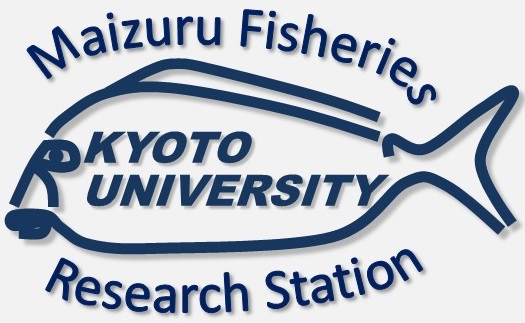1. Professors
MASUDA Reiji (Professor, Director of the Research Station)
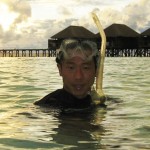 Contact: masuda.reiji.3w*kyoto-u.ac.jp (replace * by @), +81-773-62-9063 (Phone)
Contact: masuda.reiji.3w*kyoto-u.ac.jp (replace * by @), +81-773-62-9063 (Phone)
Specialty: Fish psychology
Hobby: diving, tennis, marathon, piano
Research theme:
Fish psychology is a research field that deals with the behavior and ecology of fishes through an approach of experimental psychology. “How do fish maintain a school?”, “How smart can fish be?”, “What will happen to fish populations if jellyfish blooms expand?” Research is often based on questions that arise from diving or talking with fishermen. Rearing experiments are then related to the fluctuation mechanism of pelagic fish stocks. We also conduct experiments and observations applicable to the improvement of releasing strategies in marine stock enhancement.
Career and Publications:
Jump to the Activity Database on Education and Research, Kyoto University
KAI Yoshiaki (Associate professor)
 Contact: kai.yoshiaki.4c*kyoto-u.ac.jp (replace * by @), +81-773-62-9079 (Phone)
Contact: kai.yoshiaki.4c*kyoto-u.ac.jp (replace * by @), +81-773-62-9079 (Phone)
Specialty: Fish systematics
Hobby: Bass guitar
Research theme:
Fishes constitute more than one-half of the total number of living vertebrate species, exhibiting enormous diversity in morphology and ecology. In Japan, about 3800 species are recognized as valid species. We try to understand and describe their diversity and estimate how they have speciated and evolved by morphological and genetic (mtDNA and AFLPs, and so on) analyses.
1. Systematics of rockfishes, snailfises, and lumpsuckers
2. Phylogeography focusing on fishes of the Sea of Japan
Career and Publications:
Jump to the Activity Database on Education and Research, Kyoto University
SUZUKI Keita (Assistant professor)
 Contact: suzuki.keita.3r*kyoto-u.ac.jp (replace * by @), +81-773-62-9094 (Phone)
Contact: suzuki.keita.3r*kyoto-u.ac.jp (replace * by @), +81-773-62-9094 (Phone)
Specialty: Coastal and estuarine ecology
Hobby: jogging, swimming, hiking
Research theme:
Coastal and estuarine areas are characterized by many anthropogenic modifications as well as high natural productivity. Water pollution, shore protection, land reclamation, dredging, etc. are threatening the survival of coastal and estuarine organisms. I study the ecology of fish and crustaceans, specifically their distribution, feeding habits, growth, and survival during the early life stages when they are vulnerable to environmental changes. I aim at finding our way of living with coastal and estuarine organisms on the basis of the understanding of their life histories.
1. Ecology of larval and juvenile fish
Early life history (e.g. migration, feeding, growth, survival) is key to understand essential environmental conditions for successful reproduction in each fish species.
2. Ecology of zooplankton
The ecology of copepods and mysids (e.g. position maintenance, feeding, growth, survival) is key to understand zooplankton production underlying fish production.
3. Production relative to environmental fluctuations
The dynamics of coastal and estuarine production can be explained by environmental fluctuations on various temporal scales (e.g. climate change, seasonal change, fortnightly tidal cycle).
Career and Publications:
Jump to the Activity Database on Education and Research, Kyoto University
HENMI Yumi (Assistant professor)
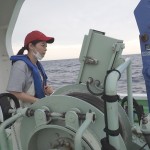 Contact: henmi.yumi.7c*kyoto-u.ac.jp (replace * by @), +81-773-62-9076 (Phone)
Contact: henmi.yumi.7c*kyoto-u.ac.jp (replace * by @), +81-773-62-9076 (Phone)
Specialty: Symbiotic ecology
Hobby: playing with my cats, bird watching
Research theme:
1. Ecological studies of inquilinism
Ecological aspects of gobies and crustaceans living in animal burrows in marine sediments are studied through field observations and laboratory experiments.
2. Burrow morphology
The burrow morphology of host animals is the key to understand the host-symbiont interaction in burrow inquilinism.
Career and Publications:
Jump to the Activity Database on Education and Research, Kyoto University
Jump to my personal page
YATSUYANAGI Tetsu (Program-specific assistant professor)
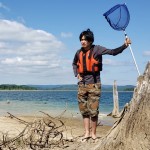 Contact: yatsuyanagi.tetsu.2y*kyoto-u.ac.jp (replace * by @), +81-773-62-5700 (Phone)
Contact: yatsuyanagi.tetsu.2y*kyoto-u.ac.jp (replace * by @), +81-773-62-5700 (Phone)
Specialty: Fish ecology
Hobby: watching sports (especially sumo and baseball)
Research theme:
I am interested in how organisms move, form their distributions, and maintain diversity underwater, where human sight is limited. Utilizing environmental DNA (eDNA) methods to analyze diverse DNA fragments released into the water, I conduct ecological and evolutionary research in various fields, including seas and rivers.
1.Community Ecology
Biological communities interact at both local and regional levels through dynamic fluctuations. By focusing on environmental characteristics and seasonal migration, I aim to figure out the factors that determine diversity and stability in communities.
2.Phylogeography
Based on the distribution of genetic lineages within species, I investigate the historical processes that have shaped their distributions and identify hotspots of genetic diversity.
Career and Publications:
Jump to the Activity Database on Education and Research, Kyoto University
OBATA Kota (Program-Specific Researcher(PD))
 Contact: obata.kota.8m*kyoto-u.ac.jp (replace * by @)
Contact: obata.kota.8m*kyoto-u.ac.jp (replace * by @)
Specialty: Fish morphology and taxonomy
Hobby: walking in nature, reading
Research theme:
Pelagic larval-fish morphology: its adaptive significance and evolutionary mechanism
How is the morphological diversity of pelagic larval fish related to the ecological aspects of each species? What ontogenetic and evolutionary mechanisms contribute to the morphological diversification of larval fish? I would like to reveal the morphological strategy of marine fish in their early life histories by comparing the patterns of ontogenetic morphological changes among species having different PLD (pelagic larval duration). I am planning to collect flatfish larvae in Wakasa Bay.
Career and Publications:
Jump to the Activity Database on Education and Research, Kyoto University
YAMASHITA Yoh (Emeritus professor)
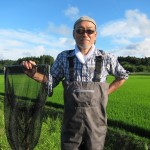 Contact: yamashita.yoh.4c*kyoto-u.ac.jp (replace * by @)
Contact: yamashita.yoh.4c*kyoto-u.ac.jp (replace * by @)
Specialty: Coastal marine ecology
Hobby: fishing, cheering for Fukuoka SoftBank Hawks (Japanese professional baseball team)
Research theme:
I study how watershed environments and human activities affect the ecology of organisms, structure of biological production, and biodiversity in lower reaches, estuarine and coastal areas of rivers. This leads to the interdisciplinary study Connectivity of Hills, Humans and Oceans (CoHHO), which investigates integrated watershed and coastal management to recover richness and wellness in aquatic environments. At present, I focus on the ecological significance of the upstream migration of adult temperate seabass Lateolabrax japonicus.
Career and Publications:
Jump to the Activity Database on Education and Research, Kyoto University
